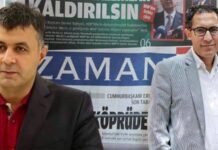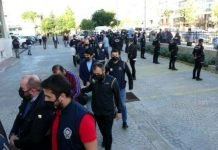Zabit Kişi, a former teacher who was abducted from Kazakhstan by Turkish intelligence agency MİT, said in a letter to Peoples’ Democratic Party (HDP) deputy Ömer Faruk Gergerlioğlu that he did not have access to proper healthcare in prison.
In the letter, which was made public on social media, Kişi said despite a lesion on his liver, he had not been taken to the hospital for months for a follow-up consultation. He claimed that the prison administration made him sign a petition saying it was his decision not to go the hospital.
“I suffer from debilitating pain that does not go away even with the strongest painkillers,” he said.
Lack of proper healthcare in prisons has been repeatedly criticized by human rights activists. Many have argued that health problems were often ignored until it was too late for inmates to be treated.
Kişi, a teacher, moved his family to Kyrgyzstan with the hope of landing a job after he became unemployed in Turkey in December 2015. The private school he had been working for was closed after a government crackdown on schools run by businesspeople close to the Gülen movement.
Turkish President Recep Tayyip Erdoğan has been targeting followers of the Gülen movement, inspired by Turkish cleric Fethullah Gülen, since the corruption investigations of December 17-25, 2013, which implicated then-prime minister Erdoğan, his family members and his inner circle.
Dismissing the investigations as a Gülenist coup and conspiracy against his government, Erdoğan designated the movement as a terrorist organization and began to target its members. Erdoğan intensified the crackdown on the movement following a coup attempt on July 15, 2016 that he accused Gülen of masterminding. Gülen and the movement strongly deny involvement in the abortive putsch or any terrorist activity.
In his absence the authorities issued an arrest warrant for him, based on allegations that he was linked to alleged putschist admirals at the Gölcük Naval Command. It became obvious during cross-examination in court that the allegations were baseless and that neither of the admirals knew him nor did he know the admirals.
Kişi’s ordeal started when he was detained in Kazakhstan for immigration irregularities when he traveled from Bishkek to Almaty. The Kazakh court ordered him to return to Kyrgyzstan, where had had a family and maintained a residence. On September 30, 2017, he went to the airport with his lawyer for deportation procedures in Almaty and started waiting for his flight to Bishkek. During the security check, his lawyer was told he could not accompany him.
He was detained again at the airport and confined to a room. He overheard airport officials talking about a plane from Turkey that would be landing soon to pick him up. A MİT team forcibly removed him from the terminal and put him on a plane he described as painted with a camouflage pattern.
A minivan picked him up after landing at the airport in Ankara, and he was driven to what he described as a freight container where he was subjected to torture and abuse for more than three months.
Although Kişi requested an investigation into his allegations of torture, authorities rejected his appeals.
















